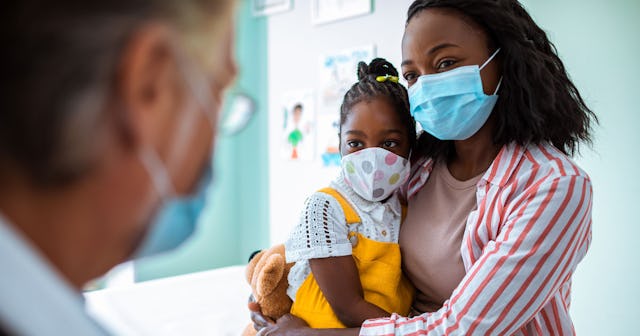How Can We Keep A Positive COVID Result From Having A Negative Impact On Kids' Mental Health

For the past two years, the never-ending topic of discussion has been COVID. How many people have been infected? What do we know about the newest COVID variant? How can we protect ourselves and our kiddos? What will the effects of living in a COVID world have on our mental health? Frankly, it’s been exhausting. And to be a parent during this has been an unprecedented challenge, to say the least.
Not only are we worrying about not contracting COVID ourselves, we’re even more concerned about what happens if our kiddos pick it up. With omicron burning through our communities like a forest fire, our littles will probably end up catching it.
The good news? While this variant spreads faster, it appears to be milder. The bad news? COVID is synonymous with anger, frustration, and downright awfulness. So, when (not if) our kiddos pick it up, what kind of shame, frustration, or other mental health consequences might they face?
When we say we hate COVID, what kids hear is, I hate that my child has COVID. I’m disappointed that my kid caught COVID. We know it’s not their fault. And even though they’ve been taking safety precautions, it’s nearly inevitable at this point. But we don’t always express that as clearly as the kiddos need us to. So as parents, how can we help our kids when they do test positive not to see it as a failure? What do we say to them to reassure them that it isn’t their fault and they didn’t do anything wrong?
Protecting Your Children’s Mental Health
If you’re concerned about your child’s mental health before, after, or any time during COVID exposure, there are a few things the experts recommend paying close attention to. This isn’t an exhaustive list, but there are some red flags.
Sleep Patterns or Regression in Behavior
Losing sleep is something that happens to all of us when we’re faced with new challenges, stresses, or anxieties. And navigating life inside a never-ending pandemic is no exception. According to HealthyChildren.org if your child has trouble falling or staying asleep, take note. The more specific details you can share with a pediatrician, the better they can help your child get back to their regular schedule.
Unprovoked Distress or Loss of Interest
Everything feels overwhelming right now. Your kids don’t know from one day to the next if they’ll see their classmates in person or if one week’s worth of virtual classes will become several months. Feeling distressed is almost to be expected.
If things are going pretty well and have been even-keeled, but your little is still feeling down and out, maybe it’s time to have a chat. Is that overwhelming sense of disappointment because everything we were told about COVID keeps changing, or is it because they’re feeling like a failure because they caught COVID?
Have Open Conversations
A child psychologist at the Child Mind Institute reminds us, “Kids feel empowered when they know how to keep themselves safe.” Having conversations with them about what is within their control and what isn’t will help ease the negative feelings they might get about contracting COVID.
As we said before, explaining everything we left unsaid when we make broad statements damning COVID’s existence is important. Reassuring your kids, having an open dialogue, and letting them know they can come to you with any questions, will do wonders for their mental health.
Use Self-Care As Preventative Measure
Just like your kids have an annual physical to keep their physical health in check, make sure they’re taking time for self-care. A lot of schools have implemented mindfulness practices as part of their curriculum. So chances are your kids already know a thing or two about them.
Other self-care options for your littles could include meditation, journaling, or even something as simple as coloring together. My girls and I do this together all the time. And honestly, it might surprise you how chatty they become about things they didn’t really want to open up about before.
Living in a world that feels upside down 99% of the time is hard enough for our kids. But helping them take care of themselves and their feelings can only do good. If they catch COVID and have big and conflicting feelings about it, don’t dismiss them.
Reassure them that they did nothing wrong and that sometimes things happen that are out of our control. When we live in a time where everything changes at a moment’s notice, all any of us can do is our best.
This article was originally published on